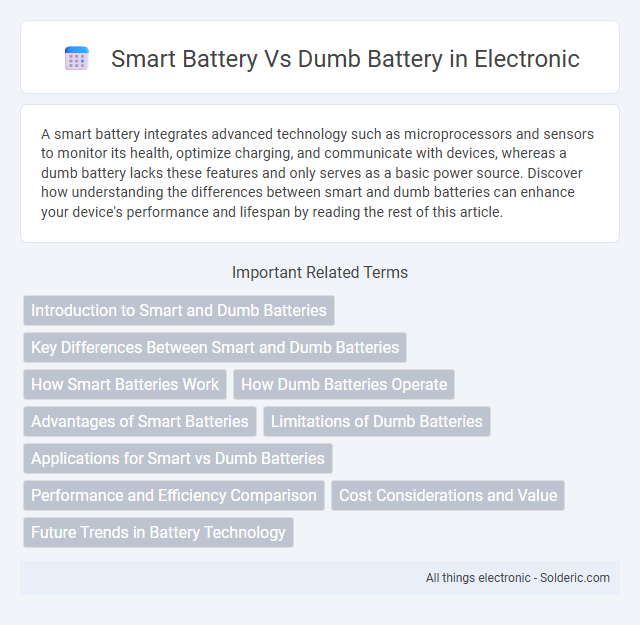A smart battery integrates advanced technology such as microprocessors and sensors to monitor its health, optimize charging, and communicate with devices, whereas a dumb battery lacks these features and only serves as a basic power source. Discover how understanding the differences between smart and dumb batteries can enhance your device's performance and lifespan by reading the rest of this article.
Comparison Table
| Feature | Smart Battery | Dumb Battery |
|---|---|---|
| Definition | Battery with integrated electronics that monitor and manage battery status | Basic battery without internal electronics or monitoring features |
| Battery Management | Automatic charge and discharge control, health monitoring | No charge control or health monitoring |
| Communication | Communicates status data to host devices (e.g., via SMBus, I2C) | No communication capability |
| Safety Features | Includes overcharge, over-discharge, and temperature protection | Minimal or no built-in safety mechanisms |
| Battery Life Optimization | Yes, optimizes charge cycles for longevity | No optimization, prone to reduced lifespan |
| Cost | Higher due to embedded electronics | Lower cost and simpler design |
| Applications | Laptops, smartphones, electric vehicles, medical devices | Flashlights, remote controls, basic electronics |
| State of Charge Monitoring | Accurate, real-time state of charge (SoC) data | No SoC information available |
Introduction to Smart and Dumb Batteries
Smart batteries incorporate integrated circuits that monitor and manage charging cycles, temperature, and overall battery health, enhancing performance and safety. Dumb batteries lack these intelligent features, offering only basic power storage without feedback or self-regulation capabilities. The distinction between smart and dumb batteries influences device compatibility, lifespan, and efficiency in energy management.
Key Differences Between Smart and Dumb Batteries
Smart batteries integrate advanced circuitry that monitors charge levels, temperature, and health status, providing real-time data and optimizing battery performance. Dumb batteries lack built-in intelligence, relying solely on external devices for charge control and status monitoring, resulting in less efficient power management. The key differences lie in smart batteries' ability to communicate and self-regulate, whereas dumb batteries function as simple energy storage without feedback mechanisms.
How Smart Batteries Work
Smart batteries use embedded microcontrollers to monitor charge levels, temperature, and overall health, providing accurate real-time data to your device. These batteries communicate with your device's power management system through a standardized interface, enabling precise control and optimized battery life. Unlike dumb batteries, smart batteries can prevent overcharging and overheating, enhancing safety and performance.
How Dumb Batteries Operate
Dumb batteries operate using a simple chemical reaction to store and release electrical energy without any internal circuitry for monitoring or communication. They rely on external devices to regulate charging and discharging processes, which can lead to inefficiencies and potential safety risks. The lack of smart technology means these batteries cannot provide real-time data on state of charge or health, limiting their effectiveness in advanced applications.
Advantages of Smart Batteries
Smart batteries offer enhanced energy management through integrated circuits that monitor charge levels, temperature, and health status, extending battery lifespan and improving safety. These batteries provide real-time communication with devices, enabling accurate power estimation and preventing overcharging or deep discharging. Advanced features like predictive maintenance and adaptive charging algorithms result in higher efficiency and reliability compared to dumb batteries.
Limitations of Dumb Batteries
Dumb batteries lack the built-in circuitry to monitor charge levels, temperature, and health, leading to inefficient energy use and a higher risk of overcharging or deep discharge. Their inability to communicate with devices prevents accurate battery status reporting, potentially causing unexpected shutdowns and reduced device performance. You may experience shorter battery lifespan and inconsistent power delivery compared to smart battery technology.
Applications for Smart vs Dumb Batteries
Smart batteries are commonly used in laptops, smartphones, and electric vehicles due to their integrated microcontrollers that provide real-time data on state of charge, health, and temperature, enhancing device performance and safety. Dumb batteries, lacking embedded electronics, are typically found in basic devices like remote controls, flashlights, and traditional power tools where monitoring and communication capabilities are unnecessary. The application of smart batteries in critical electronics ensures optimized energy management, while dumb batteries serve cost-effective and straightforward power needs.
Performance and Efficiency Comparison
Smart batteries optimize performance by continuously monitoring charge levels, temperature, and health parameters, ensuring longer lifespan and efficient energy use. Dumb batteries lack these features, leading to inconsistent power delivery and reduced efficiency over time. Your devices benefit from smart batteries through improved reliability and sustained optimal performance.
Cost Considerations and Value
Smart batteries typically have higher upfront costs due to integrated microchips that monitor and manage charge cycles, enhancing longevity and safety. Dumb batteries offer a lower initial price but lack advanced features, often leading to shorter lifespan and potential replacement expenses. Evaluating cost considerations reveals that smart batteries provide better long-term value through improved efficiency and reduced maintenance.
Future Trends in Battery Technology
Future trends in battery technology emphasize smart batteries integrating advanced sensors and microprocessors for real-time monitoring and optimized energy management. These intelligent systems enhance battery life, safety, and performance compared to dumb batteries, which lack communication capabilities and adaptive controls. Your choice of smart battery ensures compatibility with emerging renewable energy solutions and electric vehicles, positioning you at the forefront of efficient energy storage innovations.
Smart battery vs Dumb battery Infographic

 solderic.com
solderic.com